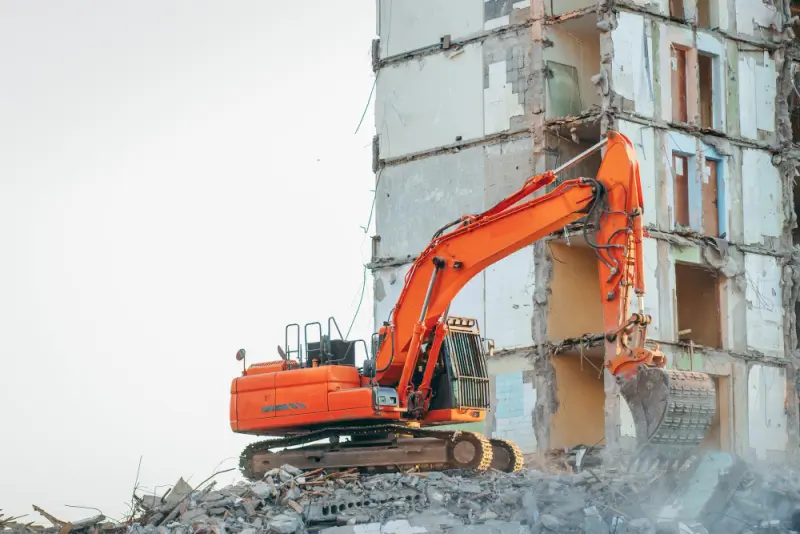Demolition Jobs: Your Path to a High-Paying Career in Construction
Breaking into demolition jobs doesn't require years of experience or expensive training. With construction booming nationwide and infrastructure projects multiplying, demolition companies desperately need workers. Entry-level positions start at $18-25 hourly, with experienced workers earning $45+ per hour plus overtime.
What Exactly Are Demolition Jobs?
Demolition jobs involve the strategic dismantling of structures – from small residential homes to massive industrial complexes. Workers use specialized tools and heavy machinery to safely tear down buildings, remove hazardous materials, and clear sites for new construction.
Modern demolition goes far beyond swinging sledgehammers. Today's demolition workers operate excavators, manage asbestos removal, coordinate with engineers, and solve complex structural challenges. Every project differs, keeping the work engaging and mentally stimulating.
The variety attracts workers tired of repetitive factory or office routines. One day you're carefully removing lead paint from a historic building. Next, you're operating a 50-ton excavator to demolish a warehouse. This diversity builds valuable skills that transfer across the entire construction industry.

Physical Requirements and Starting Qualifications
Let's address the obvious – demolition work is physically demanding. You'll lift 50+ pound materials, operate vibrating equipment, and work in various weather conditions. However, most workers adapt within 2-3 weeks, building job-specific strength and endurance.
Basic requirements include:
- Ability to lift/carry 50 pounds repeatedly
- Standing/walking for 8-hour shifts
- Following safety protocols precisely
- Basic English comprehension for safety instructions
- Reliable transportation to job sites
- Passing drug/background checks
No prior construction experience? No problem. Most companies provide on-the-job training. They value reliability, work ethic, and willingness to learn over specific backgrounds. Even workers in their 40s and 50s successfully start demolition careers.
Career Paths and Earning Potential
Demolition jobs offer clear advancement opportunities. Starting as a general laborer ($35,000-45,000 annually), you can progress to equipment operator ($50,000-75,000) within 1-2 years. Specialists and supervisors earn $80,000+ with overtime.
Common progression routes:
Year 1: Demolition Laborer Learn safety protocols, basic tool operation, and site procedures. Handle material removal, site cleanup, and assist equipment operators.
Year 2-3: Equipment Operator Operate jackhammers, concrete saws, and small machinery. Begin training on excavators and bulldozers. Earnings jump to $25-35 hourly.
Year 3-5: Specialist or Supervisor Choose between technical specialization (hazardous materials, explosive demolition) or management (crew supervision, project coordination). Both paths lead to $60,000-90,000 annual salaries.
Year 5+: Project Manager Plan entire demolition projects, coordinate subcontractors, ensure regulatory compliance. Experienced managers earn $75,000-120,000+ yearly.
How to Land Your First Demolition Job
Breaking into demolition jobs requires strategy but isn't complicated:
1. Get OSHA 10 Certification ($75-150 online) This basic safety training shows employers you're serious. Complete it before applying to stand out.
2. Contact Local Unions Laborers' unions offer paid apprenticeships combining work with training. Search "Laborers Local [your city]" for contacts.
3. Apply Directly to Companies Google "demolition contractor near me" and submit applications. Most hire year-round, especially spring through fall.
4. Highlight Transferable Skills Any physical work experience matters – warehouse, landscaping, automotive, military. Even gaming skills (hand-eye coordination) help with equipment operation.
5. Perfect Your Application FlexCrewUSA's AI Resume Builder creates demolition-focused resumes that get noticed. It identifies relevant skills from any background and formats them to industry standards.
Daily Reality of Demolition Work
A typical demolition workday starts early – usually 6-7 AM. After safety briefings, crews tackle assigned tasks. You might spend mornings operating a jackhammer, then afternoons loading debris trucks. Physical work dominates, but problem-solving happens constantly.
Dust and noise are constants. You'll wear hard hats, safety glasses, respirators, and steel-toed boots daily. The gear becomes second nature quickly. Most workers report feeling stronger and healthier after adjusting to the physical demands.
Weather impacts schedules. Extreme conditions can halt work, so income may fluctuate seasonally. Smart workers use slow periods for training or equipment certifications, increasing their value for busier seasons.
Safety and Long-Term Sustainability
Modern demolition prioritizes safety through OSHA regulations, proper equipment, and detailed planning. Companies investing in safety training have lower injury rates than general construction. Following protocols keeps workers safe and employed.
Can you do this work long-term? Absolutely. Successful veterans prioritize proper lifting techniques, stay hydrated, stretch regularly, and progress into less physical roles. Moving from manual labor to equipment operation or supervision happens naturally as experience grows.
Building multiple skills ensures longevity. Learn various equipment, obtain specialized certifications, understand project management software. When one skill becomes too demanding, another takes over. The demolition industry rewards versatile workers with better positions and higher pay.
Why Choose Demolition Over Other Trades?
Demolition jobs offer unique advantages. Unlike new construction that slows in winter, demolition often continues year-round. Interior demolition projects proceed regardless of weather. This consistency provides steadier income than seasonal trades.
The work also offers immediate satisfaction. You see results daily – walls come down, spaces transform, progress is visible. This tangible accomplishment beats abstract office work for many people.
Demolition companies often hire workers with imperfect backgrounds. Past mistakes or limited education don't automatically disqualify candidates. The industry values current performance over past history, giving second chances to those proving themselves reliable.
Getting Started This Week
Ready to pursue demolition jobs? Take action immediately:
- Register for OSHA 10 training online today
- Update your resume using FlexCrewUSA's AI Resume Builder
- List any physical work experience, even informal
- Contact three local demolition companies tomorrow
- Visit a union hall this week to discuss apprenticeships
The demolition industry needs workers now. With infrastructure spending increasing and urban renewal accelerating, job security looks excellent for decades ahead. Starting today means earning good money next month while building a sustainable career.
Frequently Asked Questions
Q: What do demolition jobs pay in major US cities?
A: Entry-level workers earn $18-25 hourly. Major cities like NYC, Chicago, and LA pay 20-30% above national averages. With overtime, new workers can earn $45,000-60,000 annually.
Q: Is prior construction experience required?
A: No. Most companies train new hires. They value reliability and work ethic over specific experience. Military veterans, warehouse workers, and laborers transition easily into demolition.
Q: How dangerous is demolition work?
A: Following safety protocols makes demolition comparable to general construction risks. Modern equipment, mandatory PPE, and OSHA oversight significantly reduce injuries.
Q: Can I start demolition work after 40?
A: Yes. Many successful demolition workers begin in their 40s-50s. Focus on equipment operation rather than pure manual labor for longevity. Maturity and reliability are valued assets.
Q: What certifications help get hired faster?
A: OSHA 10/30, asbestos handler certification, and equipment licenses (forklift, boom lift) make you immediately valuable. Most can be obtained within 2-4 weeks.
Q: How do I find demolition jobs near me?
A: Search job boards, contact local unions, visit contractor websites, or use FlexCrewUSA's job matching services. Networking at construction supply stores also yields opportunities.
Ready to start your demolition career? FlexCrewUSA'sAI Resume Builder creates professional resumes tailored for construction and demolition jobs, highlighting your relevant skills and experience to get you hired faster.
